Vodafone Brand + Marketing Director: "Marketing Is The Perfect Blend Of Science And Art"
15 Mar, 2024
In the latest edition of Lucky Grey Cells, Maria Koutsoudakis, Brand and Marketing Director at Vodafone, shares her marketing journey from college to her current role, why she thinks brand marketing brings in innovation and fresh thinking, and unpacks the importance of data and how she balances Vodafone’s media spend.
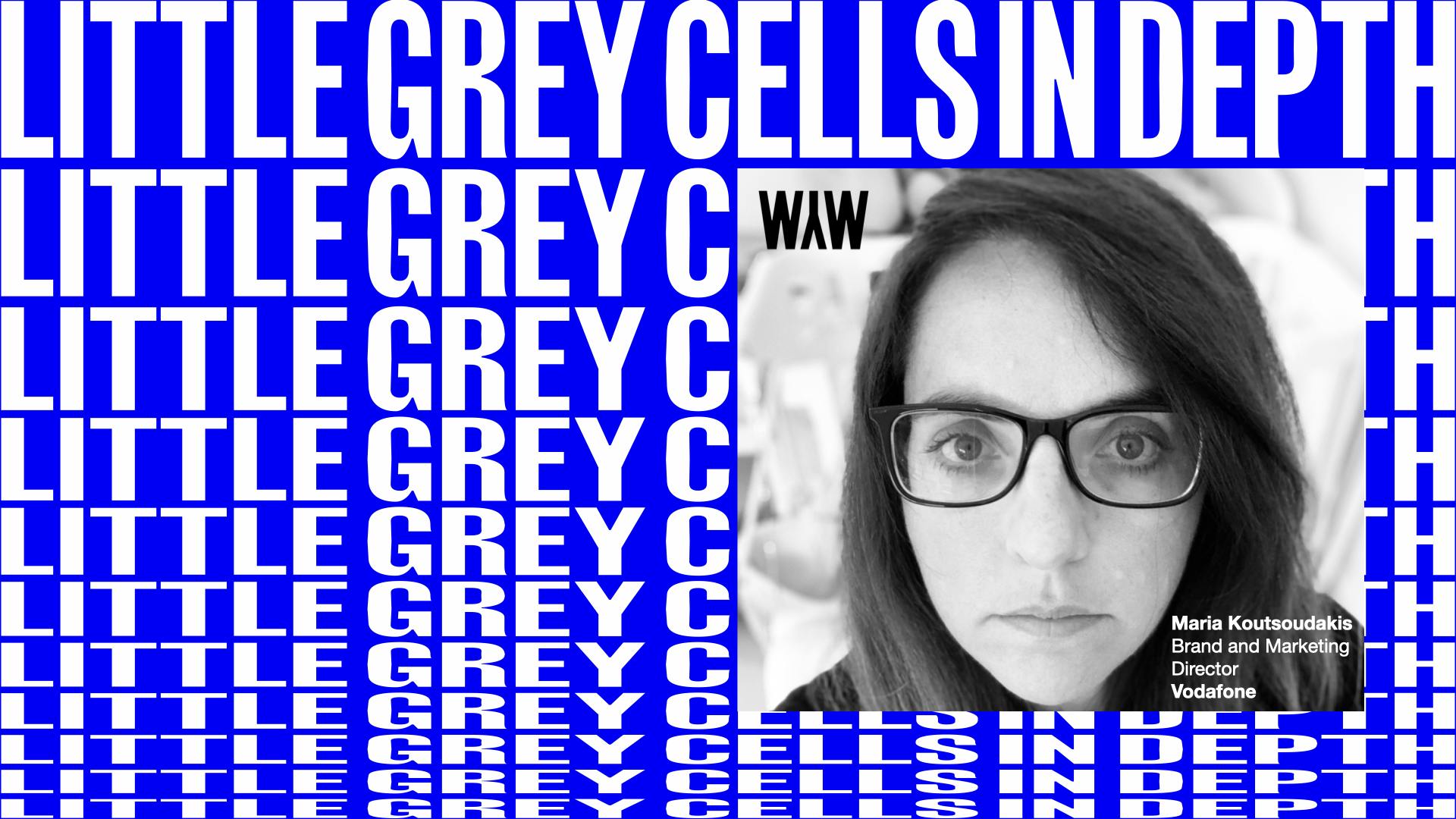
Little Grey Cells: You’ve worked at a number of businesses before settling at Vodafone - including behemoths Procter and Gamble and high street stalwarts M&S. You’ve also worked as a consultant, and now you head up Vodafone’s Brand and Marketing. Where did it all begin? And how did you end up at Vodafone?
Maria Koutsoudakis: I joined Procter & Gamble on the back of a graduate placement scheme when I finished studying at the University of Cape Town. I took a gap year before I joined. I spent 6 months in the UK marketing for the Hyatt Group of Hotels, and then I travelled for six months. At P&G I joined their graduate programme, working on hair care as assistant brand manager. I ended up staying with Procter for 12 years moving through a series of different roles across 3 continents.
After my gap year, I realised that I loved London and wanted to make my way back. Once I was Europe-based, I ran the marketing for haircare products Head and Shoulders and Herbal Essences. I also worked on premium brands like Nicky Clark and Wella colour. My husband was then transferred to Boston. Procter had just bought Gillette at the time, so I went over and ran global disposable male razors for them from the Gillette building.
On returning from Boston, I decided this was a good time to take my career in a different direction. Having joined Oxford Strategic Marketing, I got the opportunity to explore how other organisations operated. I worked on GSK, on Unilever. I was able to look at P&G for the first time with an external consultant’s view, and realised how P&G can be perceived of as a closed book - and that other organisations had different approaches and ways of thinking.
Next I joined CyDen - they had an IP in laser hair removal. Their founder, Professor Mark Clemend had started a company with the goal of selling this technology as a b2b business. The idea was that we would sell it for two years, then the company would be bought out. This was a really great learning experience for me.
I discovered that having come from a huge organisation, like P&G, I didn’t enjoy the risk profile that goes with a smaller business: for example where things like ‘cash flow’ is such a core component and you fluctuate from thinking: ‘you can make it’, to maybe 'you're not making it’ on a weekly basis. My specialism was brand and marketing, and in smaller businesses you end up doing whatever you need to do to make the business survive.. That's when I made the decision: I needed to return to mainstream brands.
My next role was at Marks & Spencer. I can't say I was specifically looking for a position in retail but the CEO of M&S was Mark Boland - he was ex-Heineken, and he wanted classically trained brand managers to come into M&S and help develop the sub-brands portfolio. He didn't necessarily want retail marketers, he wanted brand marketers. M&S had just launched the beauty department and they wanted to work on their point of difference versus the likes of Boots and Superdrug.
Sensing this was a great opportunity, I joined M&S as ‘Head of Lingerie and Beauty’. My experience in FMCG was a great foundation, and then I learned about fashion through M&S lingerie, and also to developed my knowledge of marketing beauty products. Over 5 years with M&S, I worked on some big campaigns then ultimately headed up the online merchandising brand for all non-food.
It was a tough environment to work in at that time. Eventually, I realised that I had done everything I wanted to do - from setting up a whole department for M&S, focusing on optimising the customer experience introducing the Medallia customer experience platform, NPS surveys and working closely with Salesforce. There was a changing of the guard, and it felt like a natural time to move on.
I had learned the difference between brand work in fashion and FMCG. In fashion, the brand is often determined by designers. Whereas at P&G the brand managers were the curators of the brand
Professionally, I wanted something that I could really own. I wanted to mould a brand. And I fell in love with this idea of working on a ‘meaningful British brand’. I had gone from working at P&G which came with a certain amount of anonymity - people recognise the brand, like Head and Shoulders but no-one is really sure who owns the brand or where it comes from. In contrast, working on a brand like M&S - which is a cornerstone of British culture - everyone’s got an opinion on it. Somehow that seemed more tangible and I loved that people cared.
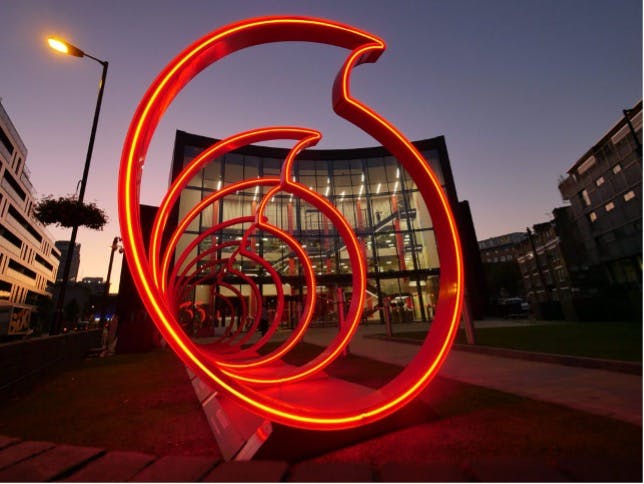
The Speechmark, Vodafone’s London HQ.
Vodafone gave me that: a big British brand, a single branded organisation. But unlike fashion, what Vodafone stands for from a brand perspective is purely in the hands of the brand marketers. We give personality to this technology-core network. Vodafone has allowed me to get back into branding. Vodafone also has the retail element which I really loved - that interaction with the customer. So in many ways Vodafone brought all of my skills and past experience together.
Five and a half years in, I still thoroughly enjoy my time at Vodafone. We’ve made real progress - from a team responsibility point of view of the brand strength to re-introducing the brand because when I joined, the brand had been at the bottom of a curve for a long time and the business had had some issues. Now we can see the turnaround: the brand is back to where it should be, we’ve engaged in more sponsorship; we've reinvested and we continue to grow.
The telecoms market is tough. It’s largely homogenised: a highly competitive, value-driven category. But Vodafone is a great brand. It's got great heritage, it's a good organisation. And there's still enough budget from a brand spending point of view: you can execute campaigns and see the impact of your activities. We’ve extended the portfolio with our VOXI brand, which we continue to invest in, and also our ‘SIM only’ service - Talkmobile - as well.
I never planned my career this way. But I always think of the next step - and try to make sense of why the next step in my career feels logical and how my experience plays into where I've ended up. Where I'm going needs to be something new that I haven't done before, but it has to seem like a logical step from my previous role. If that aligns, then it feels like the right move. And that's what I've done across the three big chunks: P&G, M&S and now Vodafone
LGC: From my research I learned that Vodafone have added 25% data use in 23. You won Best Business Mobile Network last year. I saw Vodafone at Glastonbury - and you partner with a slew of other music events. You're sponsoring tennis and rugby. Vodafone are everywhere. And if that's not enough, I read that you slashed your carbon emissions by over 90%. So in my mind, you brand is on fire. What does 2024 look like for you in terms of growing and maintaining the Vodafone brand?
MK: We will be doubling down and doing what we do better. The big news for 2024 is that we have a new creative agency, Leo Burnett, and we are working on a new creative campaign with them which launches this year.
Also we are ensuring that our CSR programmes to have everyone connected are delivering: Vodafone have connected over 2 million customers who are ‘in the digital divide’. It's a mission we've been on since COVID. We’ve taken stock of ‘digital poverty’ in the UK (where people are unable to access online services for financial reasons) and we’re addressing it.
We’re continuing with our investment in sport. It’s our third year at Wimbledon; it's our first branded year of our Women’s Rugby sponsorship. We've also started to sponsor Boardmasters, in Devon. And we're in the second year of Glastonbury and we’re doing that much better.
We've identified through Glastonbury, the meaningful difference we can make to festival goers, particularly on overnight festivals, where lack of connectivity is a huge issue. So we're looking for more and more of those opportunities: how do we serve our customers - and non-customers - at those events? It’s a huge driver for us.
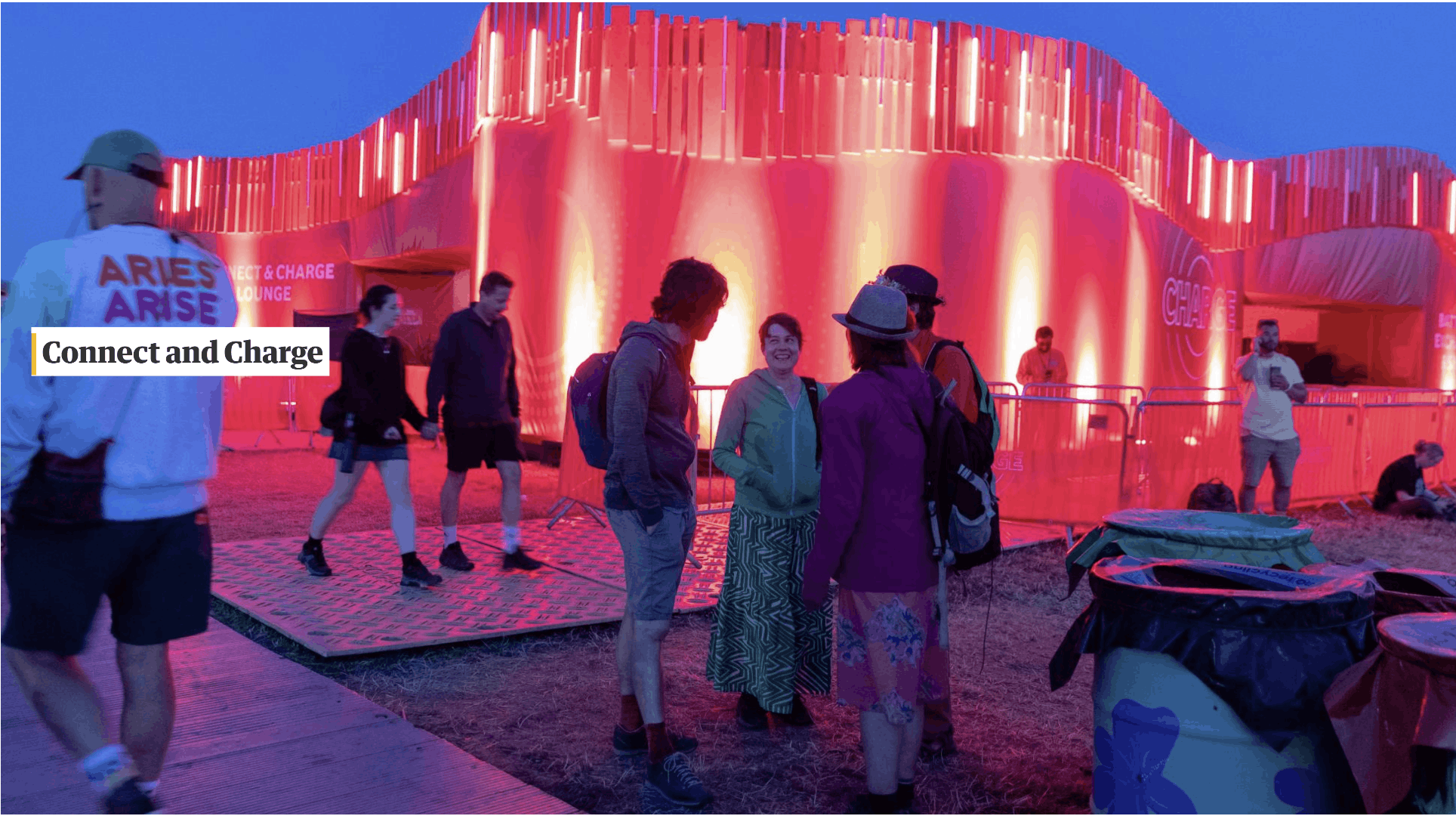
Vodafone’s soft presence at Glastonbury 2023 powered thousands of festival-goers mobile devices.
LGC: Tell us about your marketing team. How is it organised and structured?
MK: There's four main bits that are under my supervision: first is brand and communication - all of the creative that is generated to support the brand. This then sets internal communication, as well as customer marketing to our existing customer base. The second is customer insights.. We do all the brand trackers, the NPS trackers: we also do all the brand proposition work as well.
Third is social media, and that's both paid and earned social media. The team ensures that the social media element works with all of our brand campaigns. The Voxi brand is also managed from this team because it's a very social media based brand. There's a nice synergy on that.
Finally, and actually the biggest chunk of my responsibility - is in managing media and sponsorships. We have a media planning team. We have an affiliates team. We have a sponsorship team. We also have our in-house media buying team.
LGC: What have you learned in your career journey that enables you to get the best out of your marketing teams?
LGC: My starting point is always 'good intent’. I try to understand and see the good in everyone. Under different leadership, people behave in different ways. For me, it's not how people have behaved in the past, but how they behave when you give them an opportunity, as part of a team: when they get given trust and the opportunity to innovate, to be passionate about what they do and to be creative.
I've seen people in my teams be given those chances and seen them really flourish. I also think its important to give people the benefit of the doubt – as to oppose to coming in with your own bias or predisposed assumptions.
My direct report team is one of the longest serving, and I believe, (I haven't seen the stats), that I'm one of the longest serving brand directors of Vodafone. Most of my team have been here longer than me. The churn used to be much quicker - which I think is the worst thing you can do on a brand.
When it's all ‘chop and change’ - the new incumbent often changes the agency and changes the creative because they want to make a point. Brand building takes a long time. We had a good seven year strong relationship with our former creative agency, Ogilvy. Now we're changing agency, we don't take that really lightly. We felt we're at a point where we wanted some more energy and just fresh thinking - so that is what we have done.
LGC: Talking Brand Management: how important is storytelling when maximising your customers engagement with a campaign?
MK: It's huge. It’s how campaigns become memorable. What do people play back? What are we saying? What's the the collective narrative of all of our messaging? It is an ongoing conversation with my marketing team.
As a one off, you can do things that could be perceived as slightly off brand. Or you could do things that are much more promotional-driven. But collectively, when you stand back and review 12 months of initiatives, activities and promotion - it’s not only the individual stories, for me, it's the collective story that becomes really important.
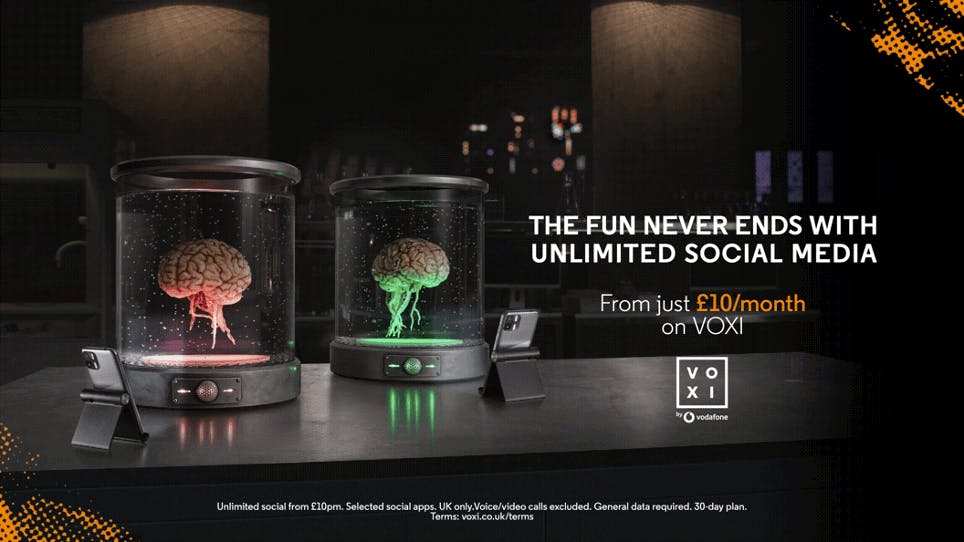
Voxi: Vodafone’s mobile network with unlimited social media
It's only when you think about the collective story that you realise the individual decisions that you make really matter: they need to elevate your broader proposition. I can't argue with you that 'not doing something on brand’ or ‘not doing a specific action in this moment’ is going to harm the brand. But for me the cumulative behaviour and storytelling is critical: because people remember the collective impact of everything you've done, which comes down to the brand story and a narrative.
LGC: Moving on to the politics of marketing in bigger businesses. Have you any tips on how to navigate the choppy waters of big business organisations, for example, where a considered marketing plan gets pushed back from the C-suite or upstairs?
MK: I lean into the P&G approach to marketing. You need data. You cannot make decisions solely based on someone's experience: you have to show the commercial impact of what you do. Sometimes you don't need to fight the decisions made by senior management - even if in your view - they go against the brand.
But you do need to make the consequences of those decisions clear. One of the worst things you can do as a brand marketer is take a cut to your budget, without explaining how this will be painful for the business. Failing to do this reinforces preset behaviours and bias that might suggest that ‘brand doesn't really have an impact’.
We use data and we use modelling as back up. We always make sure there's a tangible upside to brand marketing, but we also make sure management teams understand the downside to cutting our marketing budget.
LGC: I've observed a considerable return to what I would describe as marketing diligence, as opposed to what Mark Ritson calls ‘tactification’ where marketers leapfrog research and strategy and rush into dispensing marketing tactics. What message might you have for marketers reading this article that might be tempted or in some cases might be being told to rush straight to ‘tactification’.
MK: In order for your brand to grow, your customer (or your potential customer) needs to do something today in favour of your brand. There’s a risk today, particularly with some digital marketeers, that some don't necessarily think about consumers - instead they focus on ‘the clicks’. They don't consider the person behind, or the behaviour and the emotion behind that click. They may not be thinking about the action they want to the customer to take.
Unfortunately, some marketers think about the discipline ‘as just maths’ and only consider the digital domain. Classic brand management makes you think about getting ‘who’, to do ‘what’, by overcoming ‘barrier X’. Brand management is all about understanding consumer behaviour. Typically, we are trying to change consumers perceptions and understand consumers emotions in order to influence their behaviour so that we can grow our business.
And if we don't, I think that we just become a series of very short-term, affiliate-based type of marketing. In those cases, if you pull the media spend, the sales will buckle. Whereas with strong brand marketing, if you pull the media spend, you've at least got some equity - some brand collateral that will keep you going for a while. We used to say in my time at Head and Shoulders - if we spent nothing on brand marketing for three years the brand would probably still deliver 70 - 75% of its current sales.
LGC: You mentioned earlier that you work closely with your head of insights: what are your key pointers for ensuring clarity around market orientation - namely competitor and customer knowledge?
Again it’s what I learned at Procter & Gamble: we take it back to what the customer thinks. We try and avoid conversations like “I think”, or “you think” or “someone in the industry thinks”. In telco’s and other industries, there’s a tendency to internally overthink the customers involvement in a category. So real, validated customer data is crucial. We rely on it. We check everything we can. We've got some really short, sharp, quick, easy ‘dipstick’ research that we've put in place - but we also always go back to the customer to make sure that what we do is relevant to them and never just relevant to us as an industry shouting out.
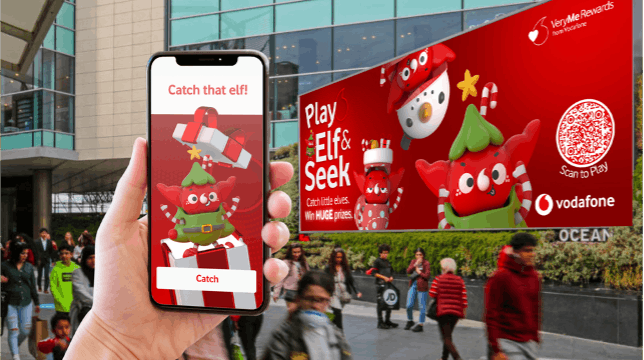
Vodafone’s ‘Elf and Seek’ game, celebrating Christmas 2023.
LGC: What advice you might have for younger marketers reading this interview? Imagine that you're speaking to a younger Maria at the start of your career in marketing, what advice might you give her? What should she do more of and what perhaps might she avoid?
MK: Be curious, be innovative. And remember, marketing is about people. These are things I find myself telling my team. Remember, you're not the customer.
The very first thing my marketing professor said to me in my first marketing lecture was: “today you stop being a normal consumer. From this day on, you will never see the world through the eyes of a normal consumer”. That's always stuck with me.
As marketers, we're much closer to the category than anyone else. Therefore, we always need to make sure that we are aligned with the consumer. It's the consumer who ultimately matters; the consumers who are boss. What matters is what a customer thinks.
Marketers should keep learning and keep stretching their abilities. Each year there are new challenges at Vodafone – ones that I have never tackled before. At M&S it was the same. Procter was a much more logical progression. I believe that in a good role, you should have the opportunity to be 60% comfortable and 40% uncomfortable. That way you stretch and keep learning.
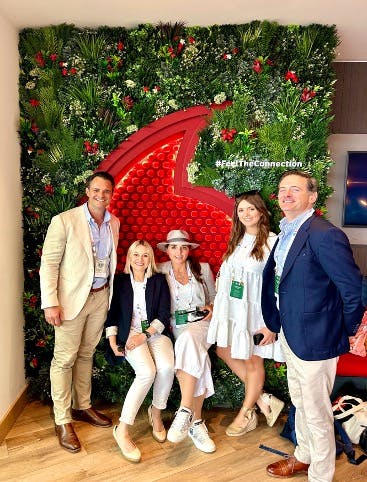
The Vodafone Team at the Vodafone Club House, Wimbledon
One should balance the desire for new challenges and learning with staying long enough with a brand to get some chunky results under your belt. If you move too fast, you will never prove what you can achieve for a brand in the long term. Successful brand management takes time.
LGC: How do you go about balancing the need for longer term brand building and more short term sales activation?
We rely on data to prove the value of brand marketing. We use data to show the impact of the ‘brand love’ stuff we do as we consolidate the brand - from a brand metrics point of view. And then we also use the econometrics modelling to show the return over a 12 month period.
We always look at short and long term campaigns from a 'Return on Investment’ point of view, but also carefully consider the ‘brand building’ point of view. Using data to show your successes is the simplest way to show illustrate the effectiveness of what you do.
LGC: Have you found any revelations when you run econometrics modelling?
MK: To be honest: no. We have had confirmation of the 60/40 rule (sophisticated long-term brand building vs targeted sales activation) - so we can show that the brand stuff pays back. Econometrics hasn’t led to any fundamental changes - but it has proved that the 60/40 split is right for Vodafone and has validated our marketing.
LGC: The question I ask all marketers - if there's one thing you've learned about marketing, it is…?
I think marketing the perfect blend of science and art. I think that's why I really love it. Marketing is not fluffy unicorns and rainbows - despite some people's perception of it. I keep telling my team: ‘brand is all about the smarts and the feels’. That's how we judge everything.
When I look around at other roles in business, I think marketing is the most fun seat at the table. In my career, I have had it constantly confirmed that marketers inhabit a privileged place where we get to do really creative, partnerships, and activations as well as be the voice of the customer. And now that's combined with rigour: science, data and ‘the smarts’ behind what we do.
As marketers we can easily flex from having an intellectual debate on the impact of the colour red - which may feel very frivolous to some - to digging into a deeper conversation about planning and strategy. Ultimately, as a brand marketer, we’re the custodian of the customer. I think that's super-important. We bring the brand perspective to the table, and the brand view always brings in innovation, fresh thinking, and the all important customer perspective. I think that's a great place to be.
Maria Koutsoudakis was interviewed by Tim Healey, CEO of Shoot 4 The Moon Marketing and Brand Management Agency, and curator of Little Grey Cells, the senior marketer breakfast meetup.
You might die tomorrow so make it worth your while. Worth Your While is an independent creative agency helping brands do spectacular stuff people like to talk about. wyw.agency.
